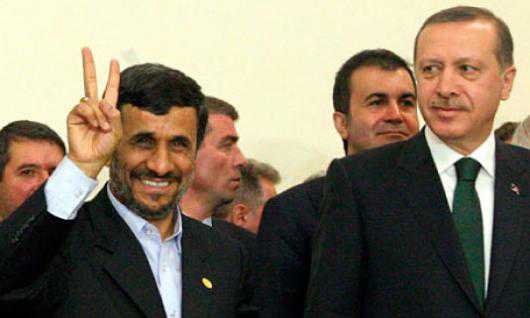By WLADIMIR van WILGENBURG

ERBIL, Iraqi Kurdistan — A recent report by the United States Institute of Peace suggests that Washington should be less concerned about increased cooperation between Turkey and Iran because the two countries have different visions for the Middle East, suggesting that the “renewal of the historical Ottoman-Persian rivalry in Mesopotamia is likely as the dominant American presence fades.”
The US is scheduled to withdraw all of its forces in Iraq in December 2011. Some observers believe that this will open the door for neighboring countries to influence Iraqi politics.
“[Iran and Turkey are] rapidly becoming the most influential external actors inside the country as the U.S. troop withdrawal proceeds,” United States Institute of Peace (USIP) Iraq program officer Sean Kane wrote in his report “The Coming Turkish-Iranian Competition in Iraq.”
“From the sixteenth century until the collapse of the Ottoman Empire after World War I, Iraqi history was largely determined by the ebb and flow of conflict between Ottoman Turks and the Safavid Persians,” Kane wrote.
The US withdrawal could result in the resumption of the competition between Iran and Turkey, the heirs of the Ottoman and Persian empires.
Iraqi Kurdish officials share this view and are anxious about the historical rivalry between Iran and Turkey. In 2010, Iraq’s Foreign Minister Hoshyar Zebari, a Kurd, identified Iran and Turkey as “the biggest players and rivals in Iraq”.
“When in August 2010, Iran opened a trade center in the Kurdish city of Sulaimani, its first such outpost, Iran’s deputy minister of commerce, complained that Turkey, which he described as ‘Iran’s rival in that country,’ had already opened twelve such centers,” Kane wrote.
Furthermore, Iran has been concerned with the high-profile visit of Turkish Prime Minister Recep Tayyip Erdogan to Erbil in April. Erbil’s Governor Nawzad Hadi told Rudaw that Iran was not very happy when the Turkish prime minister visited Kurdistan.
“Turkey and Iran compete in Kurdistan,” he said.
Joost Hiltermann, Middle East and North Africa Deputy Program Director for the International Crisis Group told Reuters that opening the Turkish consulate in Basra in October 2009 was meant to curb Iranian influence in Iraq through investments and trade.
Kane suggests that Turkey should use its “successful” outreach such as Erdogan’s visit and Turkey’s economic relations with the Kurdistan region to improve its relations with Shiite parties in Iraq.
“A similar strategic outreach to Shiite parties based on economic integration and Ankara’s and Baghdad’s common interest in a stable and strong Iraq could have similar mutual benefits,” Kane wrote.
While Turkey supported the secular Iraqiya list, an alliance of Arab nationalists and Turkmen in the March 2010 Iraqi elections, Iran supported a Shiite-dominated coalition to prevent Sunnis from taking power.
“Iran and Turkey therefore tend to work at cross purposes in Iraqi politics, as seen in the protracted power struggle surrounding Iraq’s 2010 election cycle,” Kane wrote.
The US is concerned about the continuing Iranian influence in Iraq. On June 15, American soldiers were killed by suspected Iran-backed groups in Iraq, which marked the highest casualties for the American troops in two years.
Major General Jeffrey Buchanan, chief spokesman for the US military in Iraq, told the Washington Post that the biggest threat to US troops comes from some Iran-backed Shiite groups in Iraq.
And as the deadline for the US troop withdrawal approaches, Iran is increasingly pushing the Iraqi authorities not to extend the presence of US forces.
“It is now pushing strongly, most notably through the Sadrist (Movement) and its leader Muqtada al Sadr… to prevent any request by the Iraqi government for a continued U.S. troop presence after 2011,” Kane wrote.
Kane concluded that the Turkish “blend of Islam, democracy, and soft power is a far more attractive regional template than the Iranian narrative of Islamic theocracy and hard power resistance.”
“The United States should therefore continue to welcome increased Turkish-Iraqi economic, trade, and energy ties and where possible support their development as a key part of its post-2011 strategy for Iraq and the region,” Kane writes.
via Rudaw in English….The Happening: Latest News and Multimedia about Kurdistan, Iraq and the World – Turkey and Iran Vie for Control of Iraq.